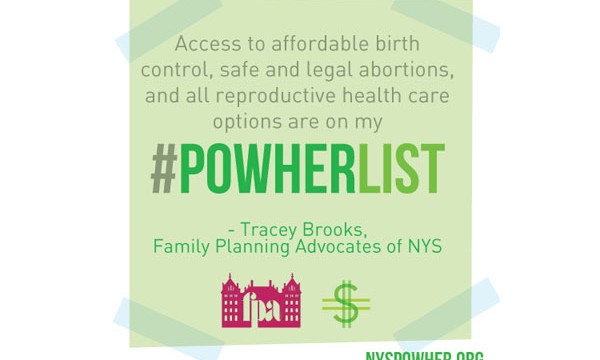This is a #POWHERList guest post from Family Planning Advocates of NYS. Watch the live Google Hangout conversation 10/8/14 at 1PM at http://bit.ly/HealthyLivesLIVE and follow along using #POWHERList.
In the state of New York, as well as across the country, some politicians hold the deep-seated misconception that a woman’s access to reproductive health care is a privilege, rather than a right. While they are willing to discuss the need for equal pay, they shy away from discussions of access to contraception and demonize access to safe and legal abortion. What these extremist politicians refuse to admit is that the ability to control our own bodies and reproductive decisions is fundamental to economic equality and justice.
Women have come so far since Roe v Wade was made law, and this is certainly in part due to access to contraception and reproductive health care. If a woman is unable to determine if or when she will have a child, she cannot plan or control her education, her career, or her financial future. In addition to the fact that supporting a child requires a certain amount of financial stability, an unintended pregnancy can interrupt and derail her education or career – or prevent her from obtaining them in the first place.
In a recent study, half or more of all women related that use of contraception had allowed them to support themselves financially, continue their education, and get or keep a job. Access to contraception provided them the autonomy to make decisions about their lives on their own terms. It is of paramount importance that women be able to plan pregnancies around their lives and not their lives around pregnancies.
Equal pay is an absolutely critical component of social justice…but without access to reproductive health care, women will continue to lack equal access to the workplace. Some extremist politicians, including those in New York, have recently latched onto empty rhetoric about the importance of equal pay and equal workplace access in women’s lives, but what is lacking in this political discourse is the acknowledgment that if we cannot decide when to become pregnant, or, just as importantly, when not to become pregnant, we cannot take advantage of these opportunities. We must have authority over our own bodies if we are to be able to enter into the workforce on anything resembling an equal footing. Otherwise, we will forever be defined by our reproductive capabilities, rather than by our possible sociocultural and economic contributions.


